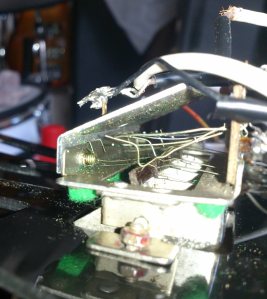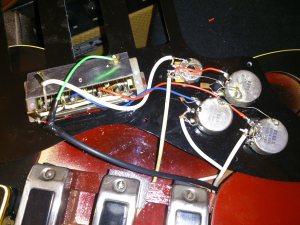“There is nothing more practical than a good theory”
Leonid Brezhnev.
Leonid Brezhnev was the leader of the Soviet Union between 1964 and 1982 – the Supreme Soviet. You’ll remember him as the ‘One with the Eyebrows’ if you’re old enough.
By some fluke of coincidence, that’s almost exactly the time period that the Jolana Tornado, later to become the Special, was produced in Soviet Controlled Czechoslovakia.
A rather odd looking beast, this was however, the best guitar Roubles could buy. In Moscow, this was the most sought after of instruments. And not long ago, one came into the workshop for restoration. And that’s how I know, there’s no way that the Soviets could ever have won the cold war!
With it’s three pickups, four knobs and four switches, it’s definitely a child of the sixties. However, this one wasn’t actually produced (I think) until 1982. The first of the specials came out of the Hradec Kralove factory in 1970, by which stage they were probably already a bit behind the times. There was no literature, and internally it was in a bit of a state.
My biggest problem was that many of the controls had been bypassed, and I had no clue what they were supposed to do. So I sent out a request on the internet and got a reply from a Jolana owner in Lithuania, Linas Peciura, who took me through the basic operations of the switching unit.
And that’s when I realised what they had tried to do. They had tried to copy the Fender Jazzmaster. I don’t think they actually had one to look at, maybe someone had smuggled in the owners manual, (one without pictures I assume). But when I opened her up, all was revealed:
All the switches were simply spring wire, pressing against the rocker actuators. Most were hopelessly bent out of shape from years of use, corroded and totally dysfunctional. Then there was the soldering. Some was clearly just bypassing broken components. It wasn’t pretty. But even the work that appeared to be original was hardly of a standard you could think of as acceptable, or even functional.
I cleaned the switch mechanisms, bent them back into what I thought was the correct positions, and then set about trying to recreate the tonal switching effects that Linas had described. It took several attempts, and eventually I worked out how the original must surely have been wired. I didn’t try to save too much of the original wire as you might do with an early Fender or Gibson. Most of it was rotten and the insulation falling off. It would simply have failed again sooner rather than later. Eventually I got to putting it back together.
And then a thought struck me – that I was holding in my hands a perfect analogy of the Brezhnev era. It was a good guitar, in theory. It had all the same switching as the Jazz master. It was bedded into a tried and tested hollow design. It should have worked. But it lacked everything that the Jazz Master was about, the modernity and aesthetics. And on top of that, it used components that simply weren’t going to last. Yes, it would go out of the factory working (hopefully, I don’t know what happened if you complained about a fault), but like a Trabant, you’d spend more time fixing it than using it!
But this wasn’t supposed to be a Trabant – this was the Zil! The top of the range. But like so many Soviet dreams, it was a steeplechaser designed by committee. And we know what we call that folks? A Camel!
So what does this tell us about the Soviet Union, and why the West Won the Cold War? Well for a start I imagine that they were, by the late 70’s, so scared that most of their kit would actually fail on the launch pad that they were too scared to even contemplate using it. Everything was falling apart, but no-one was brave enough to openly admit it.
But it’s more fundamental than that. A system where creativity is not encouraged and conformity enforced can rarely produce great designs. Especially a society where intellectual property rights no longer exist. Why create something for the state, when the state takes the credit and you take the risk of being castigated for stepping outside the norm? The incentive is gone. And so, creativity is strangled, it becomes ‘subversive’ to challenge the accepted practice. (I’ve worked for a few firms like that…)
American competition created the Fender Stratocaster and the Gibson Les Paul. As the companies strived for a foothold in the emerging rock and roll era, the flying V and Firebirds competed with the Jaguar and Jazzmaster. Driven by the need to grow sales, both Fender and Gibson sought out innovative designers to ‘get one up’ on their competitors.
Japan suffered the a similar problem in design creativity, but for more benign reasons. Their rigidly polite social systems didn’t necessarily promote creativity, but did create a culture of extreme efficiency, hard work, humility and personal responsibility – resulting in some of the best manufacturing and quality control in the world at one time. They took European and American designs, then engineered them to the highest possible levels, and at the same time they cut the cost of doing so. That’s why the Datsun 280Z was such a great car. Based on European Styling, cheaper than a Porsche, built with Japanese engineering. (Unlike the Alfa Romeo Arna. Clearly styled in Japan, built in Italy. And don’t start me on the Austin Allegro, the height of British collectivist design…..what a piece of crap! I’d have gone on strike if the alternative was making that.)
But the Soviet Union didn’t even have that Japanese drive and efficiency. When you don’t recognise the endeavours of the individual, the individual eventually fails to endeavour. That’s what Ayn Rand’s ‘Anthem’ novella was about, that Neil Peart transformed into the theme for the Rush album’2112′. The death of individuality under collectivism. A much misunderstood piece and much more succinct than her later rambling and poorly thought out ‘Atlas Shrugged’ or ‘The Fountainhead’.
Without the incentive to creativity, we stand still. Locked in yesteryear, we fail to progress. We fail to innovate, and the world eventually leaves us behind. As it did the Soviet Union’s collectivist ideals, when the people could finally no longer be held back and they threw open the Brandenburg Gate. Individuality cannot be suppressed forever, that is not the nature of the human spirit.
So what of the guitar? The owner loves it, and still plays it. It’s a quirky relic of a bygone era with a rather individual tone. He doesn’t rely on it as his main instrument though, he has a very modern Line 6 guitar with all sorts of mad innovations on it. Linas still plays his Jolanas on the professional circuit, but he’s a jazz player (and a very good one too), and treats them gently. He has a real thing for them, and I can’t say I blame him. By the time I had finished restoring it, it had grown on me too. I found myself becoming rather fond of it, it’s quirky eccentricity endearing.
But I don’t think I’d like to go into bat with it three nights a week, at least not without a good (western) spare!





By any chance, did you save any of your diagrams, or specs??? Because I got one of these in today from the Ukraine as a present from my uncle. I managed to put it together, and some of the knobs work, but I have no idea what the rocker switches are supposed to do. Plus, there are 4 knobs, and two of them seem to control part of the volume, but the other two don’t seem to do anything.
I would like to take this to the local family owned guitar shop here in town, but I hate to make them go thru holy heck trying to figure out what is what. I had the pick guard off to make one of the pickups go down. The electronics look solid, and not too complicated, and if all it is is repairing the switches, then it is doable. But how is anyone supposed to know what the switches are supposed to do in the first place??? And what the little round electric things on the inside are for.
I appreciate any help you can offer.
Squeeky Fromm
Girl Reporter
LikeLike
Hi. I don’t know what info I still have, but give me a day or two to pull out all the old paper work and I’ll send you anything I can find.
LikeLike
Thank you!
Squeeky Fromm
Girl Reporter
LikeLike